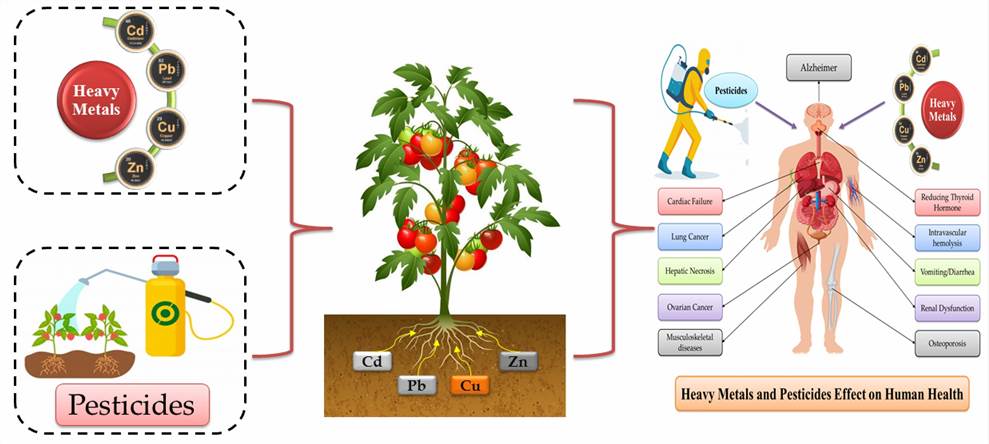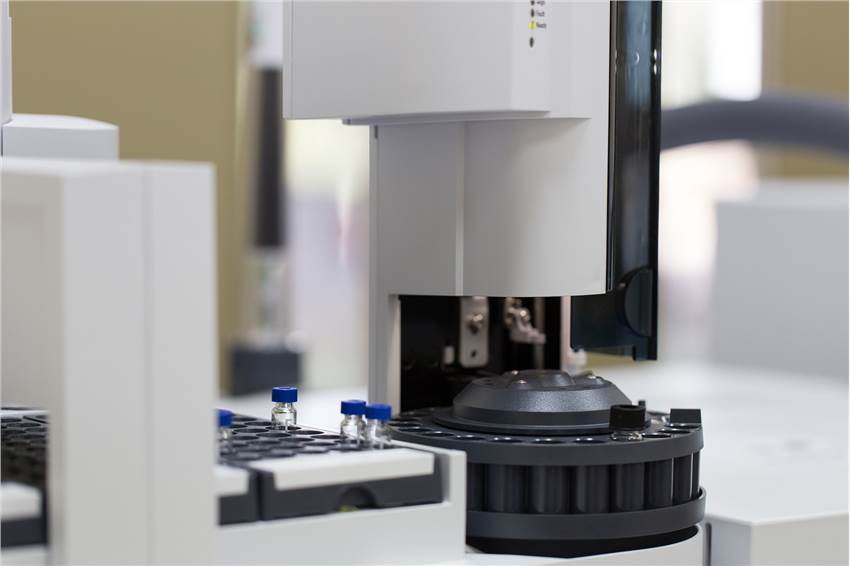Pesticides are chemicals used in agriculture to control pests and regulate plant growth and are widely used in agriculture, forestry, animal husbandry production, etc. The toxicity of a pesticide is its ability or capacity to cause injury or disease. Test animals are given varying doses of the active component and all of the formulated products of a particular pesticide in order to determine the toxicity of that substance.
Our company provides specialized pesticide toxicology testing solutions to help customers conduct pesticide application studies, including acute toxicity tests, repeat toxicity tests, specific toxicity tests, and metabolic toxicokinetic tests.
 Fig.1 Toxicity studies of heavy metals and pesticides in agricultural soils and plants. (Alengebawy A, et al. 2021)
Fig.1 Toxicity studies of heavy metals and pesticides in agricultural soils and plants. (Alengebawy A, et al. 2021)
Pesticide Toxicology Research Capabilities
Our company has the capability to perform toxicological test work on new pesticides to provide the basis for a comprehensive safety evaluation. Our pesticide toxicology studies include the following.
Testing for toxicity and specific hazards
We can perform tests for acute toxicity, chronic toxicity, accumulation toxicity, and combined toxicity by various routes. In addition, we offer to test for special hazards, including carcinogenicity, mutagenicity, teratogenicity, and causing changes in reproductive and immune function and behavior.
Explore the mechanism of toxic effects
We can explore the mechanism of the toxic effects of pesticides on mammals, the more effective development of selective, efficient, low toxicity, low residue pesticides, and the most sensitive detection indicators, to determine the threshold dose, and the development of specific antidotes.
Research on the metabolism of pesticides
The main task is to identify pesticides with or without long-term accumulation of toxicity and activation of toxic effects.

Pesticide Safety Evaluation Solutions
Pesticide Acute Toxicity Test
The acute toxicity of a pesticide is the ability of a chemical to cause harm to humans or animals from a single exposure. Acute toxicity is determined by examining test animals for dermal toxicity, inhalation toxicity, and oral toxicity. In addition, eye and skin irritation are examined.
- Acute trans-oral toxicity test
- Acute transdermal toxicity test
- Acute inhalation toxicity test
- Eye irritation test
- Skin irritation test
- Skin sensitization test
Pesticide Repeated Dose Toxicity Test
The accumulative toxicity test is to observe the accumulation of chemicals in the body or the characteristics of tolerance in animals by repeated poisoning several times in a short period of time. The accumulation of harmful substances is the basis for subacute and chronic poisoning.
The accumulation test can be used to determine the accumulation of the substance by the biological half-life of the chemical in the organism and to determine the substance and functional accumulation by the additional dose method.
Pesticide Special Toxicity Test
Pesticides are carcinogenic, mutagenic, and teratogenic, and have effects on reproductive function, immune function, and behavioral activity. Our company not only tests with whole laboratory animals but has also developed many in vitro methods, such as adding mammalian liver microsomal preparations to the test system to mimic the metabolic activation process in vivo.
- Developmental toxicity tests during pregnancy
- Reproductive toxicity assays
- Mouse bone marrow erythrocyte micronucleus assay
- In vitro mammalian cell gene mutation assay
- In vitro mammalian cell chromosome aberration assay
- Bacterial mutation test
- Carcinogenicity test
- Combined chronic and carcinogenic test
- Neurotoxicity test
Pesticide Metabolism and Toxicokinetic Test
Pesticide metabolism research mainly elucidates the absorption, distribution, biotransformation, and elimination processes of the tested substances in animals and plants, analyzes and identifies metabolites, elucidates metabolic pathways, and explores the kinetic laws of toxicants and metabolites. Our company provides pesticide toxicokinetic tests according to international standards.

If you are looking for the best solution in the field of pesticide toxicology research, please feel free to contact us.
Reference
- Alengebawy A, et al. (2021). "Heavy Metals and Pesticides Toxicity in Agricultural Soil and Plants: Ecological Risks and Human Health Implications." Toxics. 9(3): 42.
Related Solutions
It should be noted that our service is only used for research, not for clinical use.

 Fig.1 Toxicity studies of heavy metals and pesticides in agricultural soils and plants. (Alengebawy A, et al. 2021)
Fig.1 Toxicity studies of heavy metals and pesticides in agricultural soils and plants. (Alengebawy A, et al. 2021)
